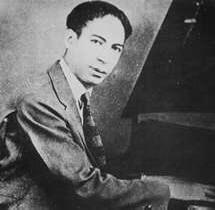
Jelly Roll Morton. Photo in public domain.
One could reasonably argue that Jelly Roll Morton, born October 20, 1890 in New Orleans, was the first great composer and piano player in jazz. Morton took it a step further and proclaimed himself the “Inventor of Jazz and Stomps.” Said Jelly Roll, "I tell you the truth—of course, any time you hear anybody, anywhere playin’ jazz, what they playin' is Jelly Roll."
Once, in a rare moment of humility, Morton confessed that his innovations resulted from his inability to remember and play ragtime pieces properly. He had to "fudge" the notes. His improvisations led him to create loose, swinging rhythms that were more informal than ragtime, and sounded a lot more fun.
It doesn’t take long to recognize the distinctive voice of a Jelly Roll Morton composition. His genius was to combine a playful, improvised spirit with the musical elements of ragtime, blues, tango, spirituals, opera and popular songs that surrounded him as a young piano “professor” employed ‘to tickle the ivories’ in turn-of-the-century New Orleans whorehouses.
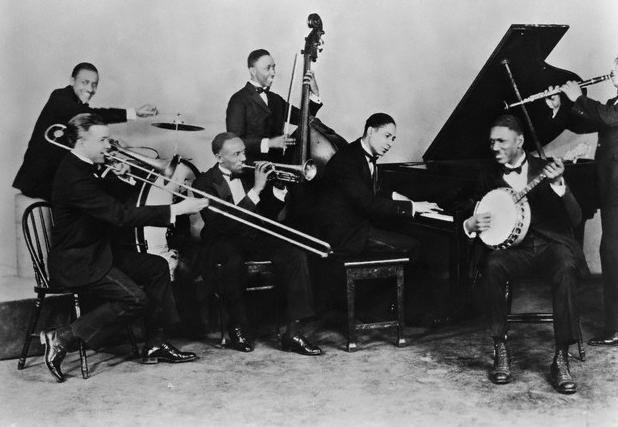
Jelly Roll Morton's band The Red Hot Peppers. Photo in public domain.
Morton had an eye for the ladies and the charm of a snake oil salesman. To tide himself over, from time to time, he put his talents to use as a card shark, a pool hustler, a pimp, and a sharpshooter in a Wild West show. He played the vaudeville stage in blackface, worked as a boxing promoter, a bartender and a bouncer, but most often as a piano player.
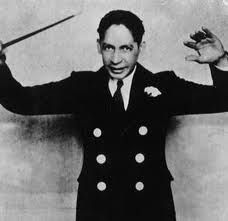
Jelly Roll Morton. Photo in public domain.
Jim Cullum says, "Jelly Roll had the real thing—musical genius so huge it put his outrageous personal bravado in second place." Morton’s 1923-24 piano solo recordings for Gennett Records and his 1926-28 recordings on the Victor label with his band of New Orleans players, the Red Hot Peppers, are still widely revered for their precision, imagination and fiery, driving rhythm.
Jazz scholar Alan Lomax commented, “There may be more deeply emotional and moving jazz records, but none are more subtly designed and brilliantly executed, none with such a rich harmonic texture, none touched with such true fire.”
On this Riverwalk Jazz radio show, The Jim Cullum Jazz Band performs classic Morton titles, “The Pearls,” “Jelly Roll Blues,” “Milneberg Joys” and "Dr. Jazz" with Dick Hyman on piano, and others with special guest jazz singer and actor Vernel Bagneris.
Both Hyman and Bagneris are leading exponents of the music and lore of Jelly Roll Morton. A Creole from New Orleans’ 7th Ward, Vernel Bagneris authored and starred in his 1995 Obie award-winning portrait of the pioneering jazz man, Jelly Roll!. The Library of Congress described Bagneris as “a master of the American vernacular,” and The New York Times hailed his portrayal of Jelly Roll Morton as “dazzling.”
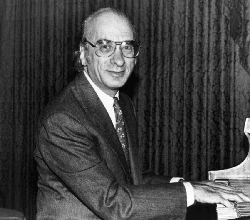
Dick Hyman. Photo courtesy of the artist
Pianist Dick Hyman's study of many historical piano styles—including that of Jelly Roll Morton—began early in his career in New York City, where he imbibed one-on-one instruction at the hands of legendary jazz piano figures such as Willie "The Lion" Smith and Teddy Wilson.
Hyman shares with us a discovery he made about a well-known Morton composition:
"The piece is called 'Sweetheart of Mine' if you sing it —and 'Froggie Moore' if you play it instrumentally. I found out that if you take it very slow, it takes on almost an operatic, dramatic character which I think even the composer didn't have in mind."
Dick Hyman goes on to perform his unusual interpretation of “Froggie Moore.” Elsewhere in the show, Hyman and John Sheridan play duo-piano, four-handed versions of two pieces that show Morton's ragtime roots, "Grandpa's Spells" and "Perfect Rag." Dick and John also share their insight into the elements of Jelly Roll's music, which were novel and innovative at the time— improvisation and an advanced harmonic sense.
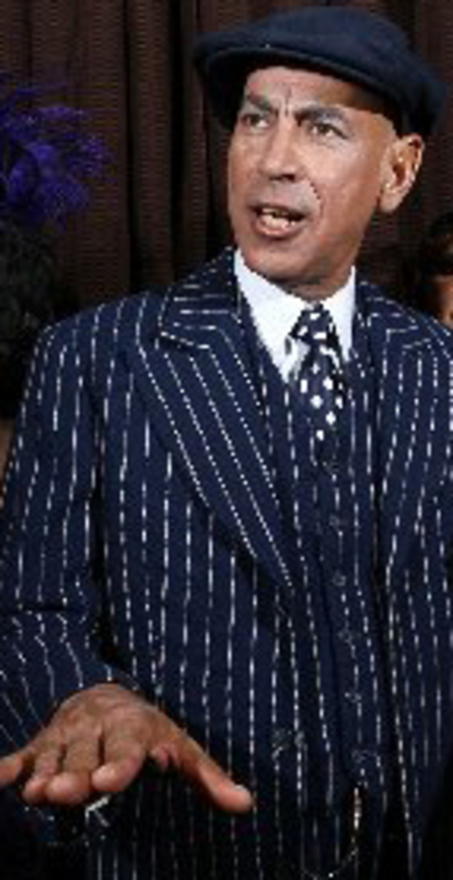
Vernel Bagneris. Photo courtesy of the artist.
Vernel Bagneris performs excerpts from his off-Broadway show, Jelly Roll!, A Me-Morial in which the title character talks about his French Creole origins, early music education, the New Orleans red-light district, and the outrage he felt late in life when he was ignored, and denied acknowledgment as a major innovator in early jazz. Vernel's script is based on interviews of Morton recorded by Alan Lomax for the Library of Congress in 1940.
Vernel and Dick Hyman perform "Mr. Jelly Lord," "Original Jelly Roll Blues," "Winin' Boy Blues" and "Don't You Leave Me Here," the latter about Jelly Roll's early romantic exploits as a traveling hustler and con-man.
Though a few of his tunes, such as King Porter Stomp, were popularized by swing era big bands, Jelly Roll Morton and his music were largely forgotten in the 1930s. Morton spent the rest of his life struggling to get by, writing letters to publishers, ASCAP and periodicals to recover lost royalties and reputation. In 1938 he wrote an article that appeared in Down Beat, ”I Created Jazz in 1902, Not W.C. Handy.”
Shortly after he died in poverty in Los Angeles in 1941, the worldwide Classic Jazz Revival got under way, and Jelly’s status as a key pioneer of jazz was restored. His tunes have been staples of traditional jazz performances for over 70 years.
Photo credit for Home Page image: Jelly Roll Morton. Photo in public domain.
Text based on Riverwalk Jazz script by Margaret Moos Pick ©1994

